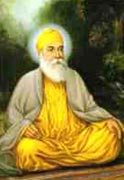|

|
Alphabetical Order
|

|
|
|
 Nanak (1469-1539), was the first guru (teacher) of the Indian religious sect known as the Sikhs. He was born in a village called Talwandi, later named Nankana, west of Lahore (now in Pakistan). Stories of his life were later collected by the Sikhs in books called janamsakhis.
Nanak (1469-1539), was the first guru (teacher) of the Indian religious sect known as the Sikhs. He was born in a village called Talwandi, later named Nankana, west of Lahore (now in Pakistan). Stories of his life were later collected by the Sikhs in books called janamsakhis.
About the year 1500, Nanak experienced what he claimed was a revelation from God. This led him to declare that "There is no Hindu, there is no Muslim." It marked the start of his mission, and eventually resulted in the founding of the new religion of Sikhism. Nanak travelled widely for many years. During his travels he met holy men and preached his message. Later, he founded the first community of Sikhs (disciples).
Nanak composed 974 hymns in a mixture of Old Punjabi and Old Hindi. The hymns were later collected in the Sikh holy book, the Adi Granth. His most famous hymn is the Japji, which Sikhs recite at dawn each day. The hymn praises the power and majesty of the one God, and teaches how the people of the world can be saved by being open to His grace. Nanak declared that neither Hinduism nor Islam could guarantee salvation. The only way to be saved was by worshipping God both privately and listening to hymns in the temple. In addition, a true believer should carry out his normal work honestly, give what he could to those in need, and live a clean and upright life. These teachings are summed up in the famous threefold formula of nam dan kirt karma, meaning "the Name, giving, honest living."
Sikhs revere Nanak as the founder of their religion, and the gurdwaras (temples) built at his birthplace are the centre of an annual pilgrimage.
|




 Nanak (1469-1539), was the first guru (teacher) of the Indian religious sect known as the Sikhs. He was born in a village called Talwandi, later named Nankana, west of Lahore (now in Pakistan). Stories of his life were later collected by the Sikhs in books called janamsakhis.
Nanak (1469-1539), was the first guru (teacher) of the Indian religious sect known as the Sikhs. He was born in a village called Talwandi, later named Nankana, west of Lahore (now in Pakistan). Stories of his life were later collected by the Sikhs in books called janamsakhis.